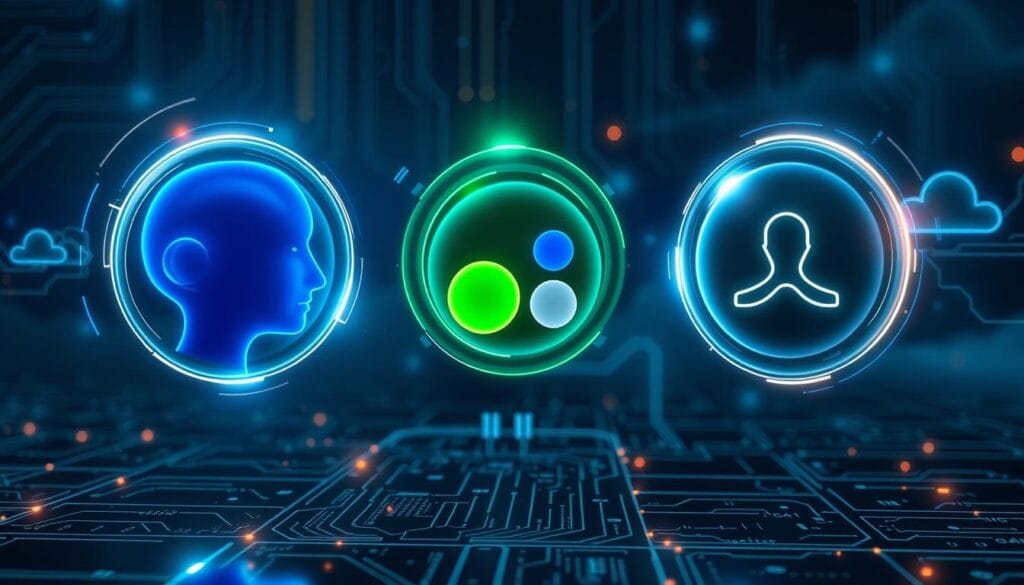When looking for the best AI technology, you might think of Microsoft, Google, and Apple. These giants are constantly improving their AI. It’s essential to keep up with the latest in AI.
Today, AI is key in our tech world. By 2023, 55 percent of companies use AI. Microsoft, Google, and Apple are at the forefront, focusing on devices, cloud services, and virtual assistants. The best AI isn’t just a product, but how it fits into your life.
When picking who’s got the best artificial intelligent microsoft google or apple, think about cloud services, virtual assistants, and device integration. Each company has its own strengths and weaknesses. Microsoft has Azure, Google has Gemini, and Apple is into generative ai.
Table of Contents
Key Takeaways
- The ai comparison between Microsoft, Google, and Apple is ongoing, with each company making significant strides in ai innovation.
- Microsoft ai, Google ai, and Apple ai are constantly evolving, making it essential to stay informed about the latest developments.
- The best ai technology is not just about individual products, but about the ecosystem and how it integrates with your daily life.
- Cloud computing capabilities, virtual assistant performance, and ai-powered device integration are crucial factors to consider in the ai comparison.
- 55 percent of organizations have adopted ai technologies as of 2023, making ai a crucial aspect of consumer technology.
- Microsoft, Google, and Apple each have their strengths and weaknesses in ai, making the ai comparison a nuanced one.
The Current State of AI Technology Giants
Exploring artificial intelligence, you’ll see top companies always improving. They’re constantly innovating. Companies like Microsoft, Google, and Apple lead this change. Each has its own strengths and weaknesses.
Apple’s value is $3.9 trillion, making it the world’s most valuable company. Nvidia’s value is $3.4 trillion, showing its big role in AI. Alphabet, Google’s parent, has a value of $2.4 trillion, focusing on AI research.
The following table highlights some key statistics about the top artificial intelligence companies:
| Company | Market Value | Revenue Growth |
|---|---|---|
| Apple | $3.9 trillion | 10% |
| Nvidia | $3.4 trillion | 94% |
| Alphabet | $2.4 trillion | 15% |
In conclusion, AI technology is highly competitive among top companies. Comparing their tech shows big differences in their approaches. Leaders in AI innovation are always exploring new possibilities, shaping the future.
Microsoft’s AI Arsenal: From Azure to ChatGPT
When you dive into artificial intelligence, you’ll see Microsoft AI is a big name. It has many tools and technologies. Azure is a key part of Microsoft’s AI tools. It’s a cloud platform for building and running AI models.
ChatGPT is another important part of Microsoft’s AI. It’s a conversational AI that can talk like a human. It can understand and answer questions in natural language.
Microsoft’s AI has many features and uses. Some include:
- AI-powered devices, such as smart home devices and wearables
- Cloud-based AI services, such as Azure Machine Learning and Azure Cognitive Services
- Conversational AI models, such as ChatGPT and Microsoft Bot Framework
Microsoft is leading the way in AI with Microsoft AI, Azure, and ChatGPT. If you’re thinking about how AI can change your business, check out what Microsoft offers.
Google’s AI Ecosystem: DeepMind and Beyond
Google’s AI world is a complex mix of technologies and tools. It includes DeepMind and TensorFlow. These tools help Google make new AI products and services, like Bard AI and natural language processing.
Some key parts of Google’s AI world are:
- DeepMind: a top AI research group bought by Google in 2014
- TensorFlow: an open-source machine learning tool made by Google
- Bard AI: a chat AI model from Google
- Natural language processing: lets computers understand and make human-like language
Google’s AI world has many uses, including:
| Application | Description |
|---|---|
| Virtual assistants | Google Assistant, a virtual helper that uses natural language processing for voice commands |
| Image recognition | Google’s image recognition tech, powered by DeepMind and TensorFlow, to spot objects in images |
| Language translation | Google Translate, a service that uses natural language processing for real-time text and speech translation |
Google’s AI world keeps growing, with new tech and tools added all the time. This makes Google a top player in AI, focusing on google ai, deepmind, tensorflow, bard ai, and natural language processing.
Apple’s Approach to AI: Privacy-First Innovation
Apple’s way of doing AI is different from others. They focus on privacy-first innovation. This means they make sure your data is safe. Their ai-powered devices aim to make your life easier without risking your privacy.
Apple doesn’t chase artificial general intelligence. Instead, they use AI to make their products better. This has led to cool features like predicting app use and better map routes. They organize your data to make things more seamless for you.
Fleet CEO Mike McNeil says Apple hit a big milestone in 2024. They released AI without risking your privacy. This shows Apple’s dedication to keeping your data safe. As they keep innovating, we can expect more cool apple ai stuff.

- Commitment to privacy-first innovation
- Focus on improving products through AI
- Organization of personal user information for AI use
- Development of innovative features, such as predictive app usage and route planning
Apple leads in ai-powered devices by putting privacy first. They keep making their apple ai better. We’re in for some exciting AI updates from them.
| Company | Approach to AI | Key Features |
|---|---|---|
| Apple | Privacy-first innovation | Commitment to user data protection, improvement of products through AI |
Who’s Got the Best Artificial Intelligent Microsoft Google or Apple: A Deep Analysis
The tech giants, Microsoft, Google, and Apple, are always pushing the limits of ai comparison. They’re constantly improving their cloud computing skills. To figure out who leads in AI, we need to look at their virtual assistants and ai-powered devices. The popularity and success of tools like ChatGPT, Canva, and DeepL give us clues.
The AI market is huge, worth over $279 billion. The US market alone is expected to hit $299.64 billion by 2026. This boom is thanks to more companies using AI, with 83% making it a key part of their plans. When comparing Microsoft, Google, and Apple, think about their strengths in cloud computing, virtual assistant skills, and ai-powered device use.
- ChatGPT leads with a market share of 54.96% in the generative AI services segment.
- Canva holds a market share of 14.92% in the AI tools industry.
- DeepL follows with a market share of 5.38%, offering online translation services with AI-powered edits.
These numbers show the wide range of AI tools available. They also highlight the market leaders.
Battle of the Virtual Assistants: Cortana vs. Google Assistant vs. Siri
When picking a virtual assistant, it’s important to look at what each offers. Cortana, Google Assistant, and Siri aim to simplify your life. Yet, each has its own set of features and limitations.
Here are some key features of each virtual assistant:
- Cortana: accessible across various platforms, offers hands-free help, answers questions, provides reminders, and manages calendars
- Google Assistant: operative on iOS and Android, facilitates real-time translation, sets reminders, schedules appointments, and controls devices with voice commands
- Siri: widely used across multiple platforms, employs natural language processing to make calls, send texts, answer questions, and provide suggestions
Think about your current ecosystem when choosing a virtual assistant. If you’re in the Microsoft world, Cortana might be perfect. For Google fans, Google Assistant is a great option. Apple users will likely prefer Siri.

The virtual assistant showdown is really about what you need and like. By examining each assistant’s features, you can pick the one that suits you best.
| Virtual Assistant | Platforms | Features |
|---|---|---|
| Cortana | Windows 10, Windows Mobile, Amazon Alexa, Xbox One, Android, iOS | Hands-free help, answers questions, provides reminders, manages calendars |
| Google Assistant | iOS, Android 7.0 (Nougat) or newer | Real-time translation, sets reminders, schedules appointments, controls devices with voice commands |
| Siri | Apple devices | Employs natural language processing to make calls, send texts, answer questions, provide suggestions |
Cloud AI Services: Comparing Azure, Google Cloud, and iCloud
When looking at cloud AI services, processing power and scalability are key. Azure, Google Cloud, and iCloud lead the field, each with its own strengths. Azure stands out for enterprise integration, with nearly 95% of Fortune 500 companies using it.
Here’s a look at how these services compare:
- Azure: Offers up to 100 services, with 69 regions worldwide, and a market share of 24%.
- Google Cloud: Provides around 60 services, with 39 regions available, and a market share of 11%.
- iCloud: While not as extensive as Azure or Google Cloud, iCloud offers a range of services, including storage and device integration.
When it comes to pricing and accessibility, each service has its own advantages and disadvantages. Azure’s cloud revenue outperformed AWS and Google Cloud in the fourth quarter of 2023. Google Cloud had US$9.2 billion in revenue, while iCloud’s pricing is more geared towards individual users, with a range of storage options available.
The following table summarizes the key features of each cloud AI service:
| Service | Processing Power | Scalability | Enterprise Integration | Pricing |
|---|---|---|---|---|
| Azure | High | High | Strong | Competitive |
| Google Cloud | High | High | Good | Competitive |
| iCloud | Medium | Medium | Fair | Consumer-friendly |
Real-World Applications and Implementation Success
As ai applications grow, we see many real-world examples of success. Companies like Amazon, Google, and Apple use ai applications to better their services and products. For example, Amazon uses AI to suggest products based on what you’ve looked at and bought before. This leads to more engagement and sales.
Google Maps is another great example. It uses AI to find the quickest routes by analyzing traffic. Grammarly also uses AI to check your text for grammar and style. These show how AI is making a big impact in different areas.

- Precision agriculture platforms using AI to analyze sensor and drone data
- Email marketing platforms like Mailchimp using AI to optimize email campaigns
- Robo-advisors like Betterment using AI to provide personalized investment advice
These examples show the wide range of ai applications and their success in many fields.
Future Roadmaps: Where Each Company is Heading
When thinking about artificial intelligence’s future, it’s key to look at Microsoft, Google, and Apple’s plans. They’re putting a lot into AI, like self-driving cars and virtual reality. Their work in AI research could lead to big growth and a big impact on the market.
These companies aim to create new tech, like quantum computers and AI that can create new things. For example, Nvidia has grown to a $2 trillion market value thanks to its AI chips. The CHIPS Act will give $52 billion to boost US chip making.
Some exciting areas to watch include:
- Autonomous driving and mixed reality advancements
- Brain-computer interface developments, with companies like Neuralink pushing the boundaries
- Quantum computing and its potential applications
- Generative AI services and the battle for AI supremacy in the chips market
The impact of these advancements will be huge. Companies like Microsoft, Google, and Apple are at the forefront. As we move forward, it’s important to think about the opportunities and challenges these advancements will bring. They will shape AI’s future.
Making the Right Choice for Your AI Needs
Choosing the right ai needs can be tough. With many ai solutions out there, it’s key to know what you need. First, think about what tasks you want to automate or improve with ai. This helps you find the best ai solutions for you.
Consider how complex and customizable you need your ai solution to be. Some offer ready-to-use models, while others let you customize more. Also, think about how well the ai solution will work with your current systems.
Here are some things to think about when making the right choice for your ai needs:
- Evaluate your specific requirements and choose an ai solution that aligns with your goals
- Consider the level of complexity and customization you require
- Think about the scalability and integration of the ai solution with your existing systems and infrastructure
By carefully looking at your ai needs and these factors, you can make a smart choice. Remember, making the right choice is key to getting the most out of ai and reaching your goals.
| AI Solution | Complexity Level | Customization Options |
|---|---|---|
| Pre-built Models | Low | Limited |
| Customizable Models | Medium | Extensive |
| Enterprise Solutions | High | Highly Customizable |
Conclusion
The battle for AI supremacy is intense among Microsoft, Google, and Apple. Each company uses its strengths to explore new AI frontiers. Microsoft excels in Azure cloud computing, Google leads in machine learning, and Apple focuses on privacy.
This competition will benefit consumers and businesses. They will get to use AI to enhance their lives and work. When choosing AI solutions, think about each company’s strengths and weaknesses.
The future of AI looks bright. Thanks to these tech giants, we can expect more amazing AI breakthroughs. By keeping up with AI trends, you and your business can succeed in this intelligent world.
